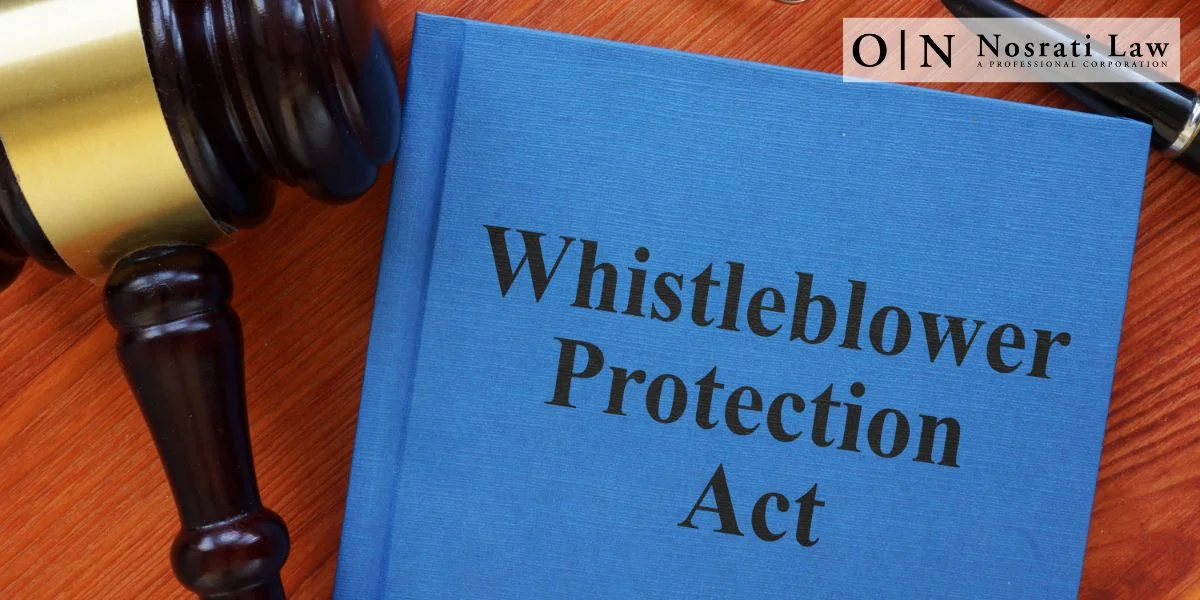
FREE CONSULT
ALL FIELDS REQUIRED*
NO RECOVERY NO FEE
Whistleblowing is the act of reporting wrongdoing or misconduct within an organization. It is an important way for employees to hold their employers accountable and to ensure that ethical standards are upheld in Santa Clarita, CA. If you are a whistleblower and have experienced retaliation or other negative consequences as a result of your actions, it is important to seek the guidance of an experienced employment lawyer.
At Nosratilaw, A Professional Law Corporation, our experienced employment attorneys are dedicated to representing whistleblowers and protecting their rights. As a team of Santa Clarita whistleblower attorneys, we are well-equipped to handle a wide range of whistleblowing cases, including discrimination, sexual harassment, and other types of misconduct.
If you are a whistleblower and have experienced retaliation or other negative consequences as a result of your actions, our Santa Clarita employment lawyers can provide you with legal representation and support. We have a strong track record of successfully representing clients in whistleblower cases and are dedicated to fighting for the rights of our clients. So, connect with us today and see how we can help you protect your rights and obtain justice.

There are many different types of wrongdoing or misconduct that can give rise to a whistleblowing case in Santa Clarita, California. Some common examples include:
To prove alleged wrongdoing in a whistleblowing case, it is vital to have strong and reliable evidence. Some common types of evidence that may be used in a whistleblowing case include:
A: The amount of damages that a whistleblower can recover in a successful case will depend on the nature and extent of the wrongdoing. A whistleblower may be eligible for damages, including back pay, compensatory damages, and legal fees. In some cases, whistleblowers may receive a percentage of any fines or penalties that the organization incurs as a result of the case. Some jurisdictions also provide financial rewards to whistleblowers who successfully uncover and report wrongdoing.
A: The timeline for filing a whistleblower complaint varies depending on the jurisdiction and type of claim. Generally, it is important to file a whistleblowing complaint as soon as possible after the wrongful conduct is discovered. However, most jurisdictions have a limited time in which a whistleblower can file a claim, so it is important to be aware of applicable statutes of limitations. Additionally, whistleblowers need to consult with a California whistleblower attorney who can help ensure that the complaint is filed within the necessary time.
A: The length of a whistleblowing investigation can vary significantly depending on the complexity and scope of the case. Generally, simple cases may take only a few months to investigate, while more complex cases can take several years. Factors that can extend the investigation length include obtaining evidence from multiple sources, dealing with conflicts between the parties involved, and the availability of resources.
A: After a successful whistleblowing case, the whistleblower may be eligible to receive compensation and other damages. Additionally, the organization in question may be subject to fines and penalties for wrongdoing, which can deter other organizations from engaging in similar activities. Finally, a successful whistleblower case can lead to increased public awareness and stronger regulations that protect whistleblowers in the future.
At Nosratilaw, A Professional Law Corporation, we are dedicated to protecting the rights of whistleblowers. Our experienced attorneys have decades of experience handling whistleblower cases and will fight for the best possible outcome in your case. If questions about whistleblowing concern you, or you want to speak with one of our attorneys, contact us today to get started.